I’ve always wanted to do jury duty. I feel like it would be fascinating. My life would change for a bit, I would be so engrossed in the case in front of me, it would be something salacious, and I would be sworn (by law) to secrecy. Such is also the case with receiving early screeners to Netflix’s Inventing Anna, the first show (er, miniseries) written by Shonda Rhimes for Netflix (she merely, and I say merely sarcastically, executive produced Bridgerton). It was an exciting occasion to sit down and watch this show early (I had signed up to write on this show almost a year ago)! I was ready for the drama! I loved Scandal, and I loved How to Get Away With Murder! They were utterly ridiculous but they were fun, they were full of murder, affairs, and were pure escapism from the real world (again, much how I envision jury duty being).
If Inventing Anna is my jury duty, then the case in front of me feels like watching a pharmaceutical merger. It’s over-concerned with specifics, takes me on detours that end up being boring, and it never really feels like there are any stakes present.
This is a show that has been in production since 2019(!) and again it’s Shonda’s first writing credit in years, so where does it go wrong?
“You Don’t Know What It’s Like to Create Something”
Perhaps the problem lies mostly in the runtime—with each episode spanning somewhere in the neighbourhood between 59-82 minutes, they’re hard to get through and I will admit I fell asleep two nights this week to this show because it’s just not captivating. Don’t get me wrong, the story of Anna Delvey/Sorokin is objectively interesting: she’s a total con/genius, a totally unreliable narrator, and has a lot of iconic lines that range from skewering basic bitches to chewing out the men who underestimate her. But this story isn’t really about her.
The story (and each episode) lose themselves in one of the characters Anna has screwed over. We learn about her through their lens, but we spend too much time on them, and not really enough time on what actually makes Anna tick (until Episode 8 when we finally do an Anna-centric episode). I guess my biggest point is why in a nine-episode miniseries should we only use the protagonist (and the excellence of Julia Garner) so sparingly? Why do we need to spend so much time with the journalist writing this story? Why do we need to get to know the staff at Manhattan Magazine? Why do we need to spend so much time with Anna’s financial advisor? Why do we care when his preferred tennis court gets taken away?
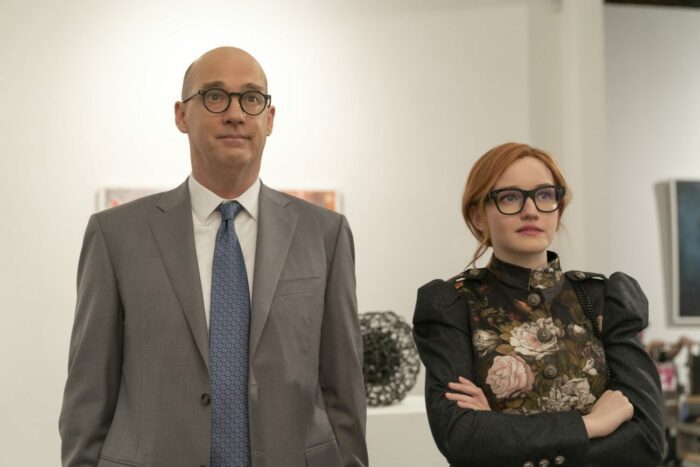
I know, I’m getting carried away with questions, I am a journalist in my own story right now trying to write some meta commentary on a show about journalism and identity and class and streaming services, but I guess the hot take I’m trying to get to right now is maybe leaving the network 44-minute structure ultimately hurt Shondaland here. So successful, so tight, so soapy, and so clutching-your-popcorn-and-red-wine during the ads, the writing is different here because it can be. But it doesn’t use Netflix’s format of freedom to its advantage. I can’t believe I’m about to come to the defense of The Politician and Ryan Murphy, but one thing The Politician did well was use shorter episodes to build smaller characters up and explore other points of view. It’s a mystery that the Shondaland team didn’t do that here, and instead chose to go longer, more expansive, but without any added pizzazz. It feels quite filler heavy in the end, and I couldn’t tell you much about her boyfriend Chase once getting to the end, or trace for you the order of people she screws over, and that’s not on how many people Anna throws under the bus, that’s on how many journalism side characters we need to endure.
“People Only Flash Money Like That When They’re Trying to Distract You From Something”
There’s a brief glimpse of the show I thought we were going to get in the first episode where Anna voices the fact that we’re about to sit on our fat asses and watch a show about her (“no, not her, me!” she exclaims as we flash to Vivian Kent (Anna Chlumsky)—the journalist). And just like that…the show focuses on Vivian. Vivian is pregnant, Vivian has a side-plot where she’s trying to gain back her reputation from a piece which ruined a friendship with her boss but also her entire journalistic reputation, and also lost her a job at Bloomberg.
It’s unclear how much we’re supposed to care about this given that when it all gets spilled near the end it just doesn’t end up being that dramatic or interesting, much like the show itself. That could have something to do with the fact that this is real life and there’s really only one way you could go with this story, but even “nonfiction” requires creativity, it requires voice, and it requires some sort of consistency, and I just don’t think any of that is really clear here.
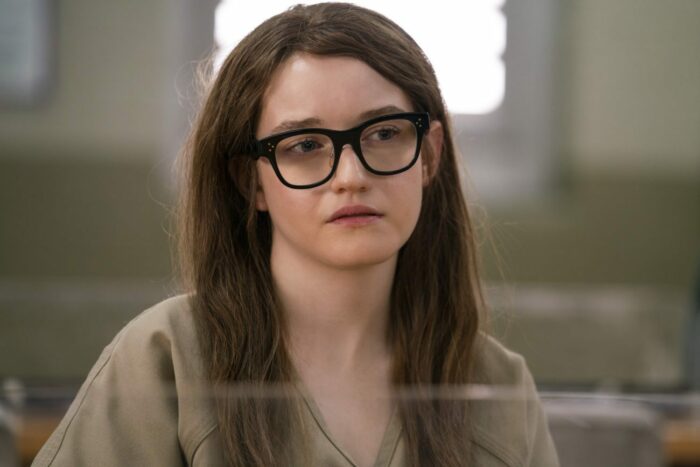
The show reminds us every few episodes that “this is a true story, except for the parts that are totally made up” but it doesn’t actually seem to clarify which parts those actually are. Sure, it tells us Anna is often making up things along the way, but Anna isn’t particularly outlandish. She’s mean, shallow, outspoken, and has a razor-sharp memory for details, but she’s also pretty well grounded. Nothing she really did throughout really shocked me, and they didn’t use any scenes to make the viewer question our recollection or opinion of her, or turn her into an unreliable narrator.
Sure, she’s an unreliable, pathological liar, but she’s rather stable in her unreliability—meaning the show misses out on the opportunity to create shock by not doubling down on certain stories only to pull us out and say what was real and what wasn’t. Again, there is merely the voiceover at the beginning, and the look into the camera at the end that tells us this is a story about Anna. Everything else feels a bit like time Vivian spends on the bus waiting to go visit her.
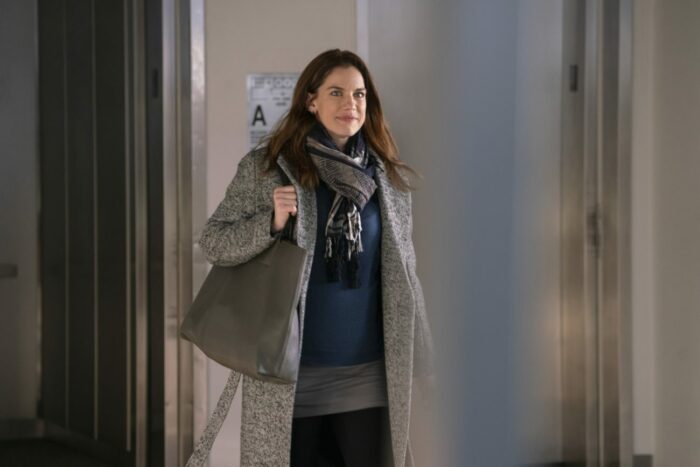
I wish Inventing Anna took more risks here or simply introduced fewer characters along the way. There are people she conned that I didn’t really care about (honestly all characters introduced in the first half). Sure, the fashion was interesting along the way, and the sights of New York, Los Angeles, Germany, Morocco (if they were indeed on location in all these places) were all breathtaking. But I didn’t need it all. The Morocco episode felt like it had the same stakes as Sex and the City 2 and yet we were supposed to believe multiple lives were in danger at one point?
I wish in moments like these they had used Vivian’s journalist character to pull us out and ask something like “really, you were actually scared?” like the voice of reason watching alongside us like Julia Stiles’ journalist character in Hustlers, which I found myself comparing this miniseries to along the way, but in the way that Hustlers is a warm duck tart filled with rhubarb compote and Inventing Anna is a dozen Costco hotdogs shoved down your throat without water. The kicker of me making a Hustlers comparison, though, is that Jessica Pressler wrote both of the articles that inspired Hustlers and Inventing Anna. The difference is that Hustlers knows she’s not a lead character.
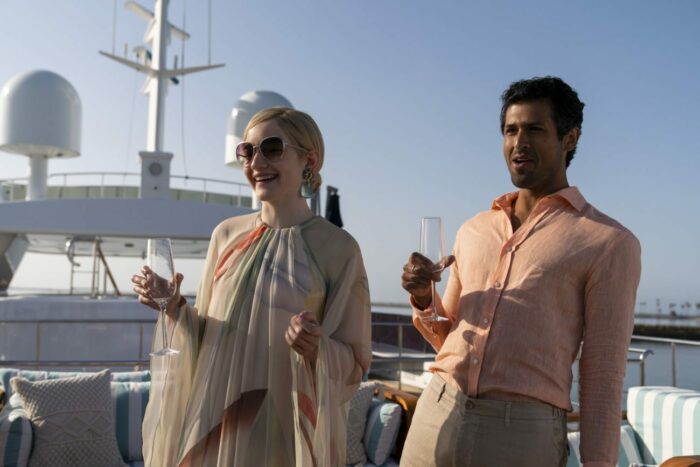
And Hustlers also knew its story was ridiculous. It knew who had the power, and it knew how to take advantage of that. It homed in on its central relationship, used its supporting cast to add laughs when appropriate, but most importantly didn’t take itself too seriously, and it used its journalist character to question the stories being told as truth. (We come to learn what’s been portrayed on screen as truth perhaps isn’t true, or that perhaps in a more nuanced way that memory cannot always be trusted, or that memory can be created.) But above the psychological pseudo-argument I’m making, Hustlers was fun. Constance Wu and Jennifer Lopez make drugs at one point and collapse on the floor, they make store clerks count out their cash, there are ridiculous moments like an Usher cameo, or Lizzo playing the flute.
In Inventing Anna, these moments are really only brought up briefly in the beginning. At one point Anna allegedly takes a dump in one of the executive’s private bathrooms with no toilet paper, or allegedly lies about being with women before. It’s a flash of stories that would’ve been fun to see but instead we spend most of the time watching her change her style and her aesthetic, we see her become “close” to a few chosen people, but we never really learn anything about her that makes it fun or laugh-out-loud funny. We don’t sit in the fact that she’s broke in terms of financial capital but swimming in terms of social capital. We constantly straddle the line of chastising her behaviour but also being reminded that if she was a man she would’ve gotten away with it all, and that the men she did screw over got promoted (but lost their tennis courts!!).
“Every Day Men Do Things Far Worse Than What I’ve Allegedly Done”
It’s the heavy-handedness of this takeaway that made me roll my eyes, and the through-line it tried to draw between its female characters. Perhaps had this show actually come out years ago (maybe pre-#MeToo) this takeaway would’ve felt fresh and nuanced, but instead it comes off as somewhat out of touch.
Inventing Anna has its moments where it tries to be intersectional and engage with race and gender and sexuality, but ultimately it continues to try and drive home the fact that its (white) women are one mistake from living the rest of their lives in shame. Again, that is very much the reality, but there has to be something more interesting to write into a script than “man shakes head disapprovingly or in a condescending manner,” or “man walks away before she can turn around, he is unable to face her”). It just all felt so stale and like a non-self aware ad for feminism. (And yes, there is a certain irony in me deconstructing feminism from my positionality, but I just wanted Anna and Vivian to be complex characters, I wanted them to feel real and not have their experiences boiled down to an oversimplified message.)
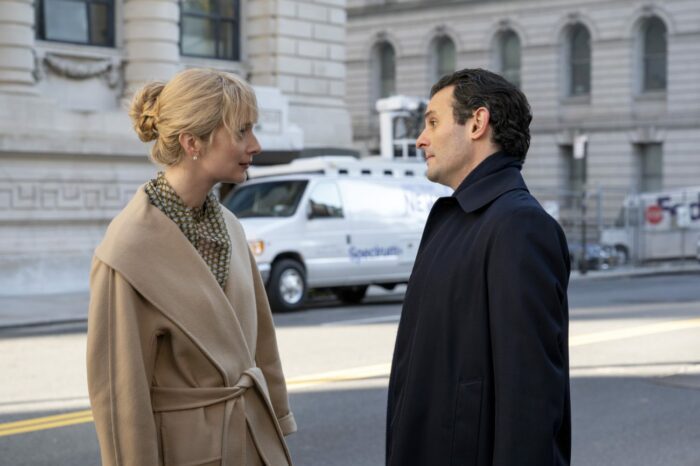
I wanted more moments of Vivian talking about why a #MeToo story is too late for Manhattan Magazine to do! I wanted more moments of Anna chewing up older white men asking them if they’re scared of death! If you want me to have a takeaway about the ADA other than her gender, sure build her up too! Why we spent more time on Anna’s financial advisor’s marriage than with her is beyond me. And I don’t even have the space to scream about how criminally underutilized former Succession and Sweetbitter scene-stealer Caitlin Fitzgerald is as an UES wife! I wanted an entire episode on her. Put her and Anna on the phone together! And give me more of Laverne Cox’s character, it’s so exciting to see a trans actor playing a cis character (finally a bit of reparations in that department) but why is she the voice of reason for literally every white character around her?
“Maybe I Never Found the Real Story”
I know I’ve been quite hard on this show, and to break the fourth wall a bit (which, God, I wish this show did more, it would’ve been so much more fun) it’s much easier to write a critique than it is to write a compliment when it comes to TV reviewing.
But I was ready to love this show, I really was. And I think I’m mostly just upset because most of the plots don’t pay off or end up feeling worthwhile. I was ready for a show full of Shonda wit, zingy one-liners, and head spinning plot-twists. I wanted to be confused, I wanted to feel jilted by Anna, I wanted her to yell at me and tell me my ass was fat again. When I postponed plans with my boyfriend to watch this show and he asked me how it was, I wanted to be able to say that it’s so good that I forgot about the life I wasn’t living and that I was living in Anna’s world. But this show ended in me texting him in all caps exclaiming what a feat I had accomplished in simply finishing it.
I watched over ten hours of content over three nights and I didn’t feel any better because of it. Inventing Anna doesn’t have anything particularly groundbreaking to say about the human experience, the female experience, the American Dream, and it also fails to provide any sort of escapism from the live you may be living right now. I’m ending my jury duty tired, exhausted, and upset—proving that like my dream of jury duty, perhaps my dreams should just stay dreams. And maybe this miniseries should’ve just stayed an article.

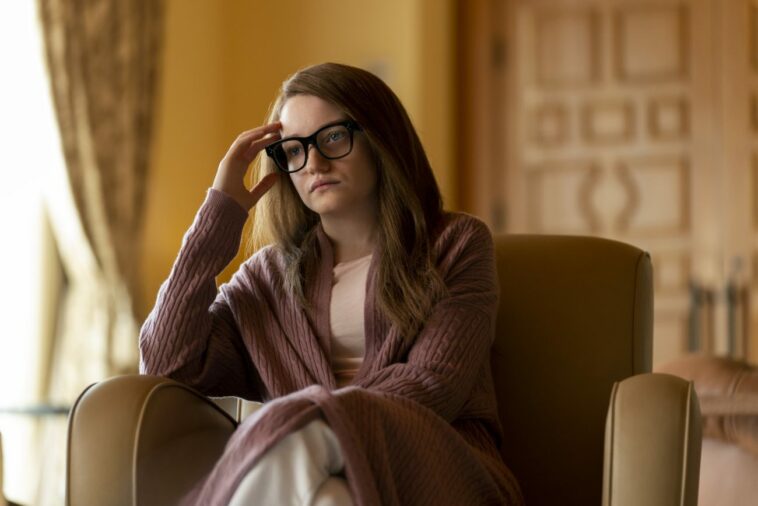
Wow. You nailed it with this review. Especially the part about how it’s an unironic ad for feminism. Ugh, it really does feel so stale to keep hearing this same trope and excuse “if I was a man it would’ve been easier/better/I would’ve got away with it/got promoted”. So tired of having this narrative shoved down my throat, us women are so much better than that and it really is nauseating to have feminists keep moaning about how men are so privileged as if men would just stop trying to succeed and do the best they can in the world.
One thing I’d like to add to this, glorifying a criminal and a con artist as some sort of modern day hero just because she’s a young woman… how is that balanced or helpful? I can’t help but wonder if Miss Sorokin conned her way into the Netflix executives heads as well.
Eyeroll indeed.
You have some really good ideas here that I agree would have made it even better, than it was, but I watched this after multiple people told me it was binge worthy, and I agree. Excellent, but your ideas could have made it even more so.
In terms of your article, really good except for this one painful sentence. “simply introduced less characters along the way.” Surely as a journalist, you know it needed to be “fewer characters.” Luckily, this is digital, so you can fix it and hopefully delete my comment. 🙂
I’ve fixed it